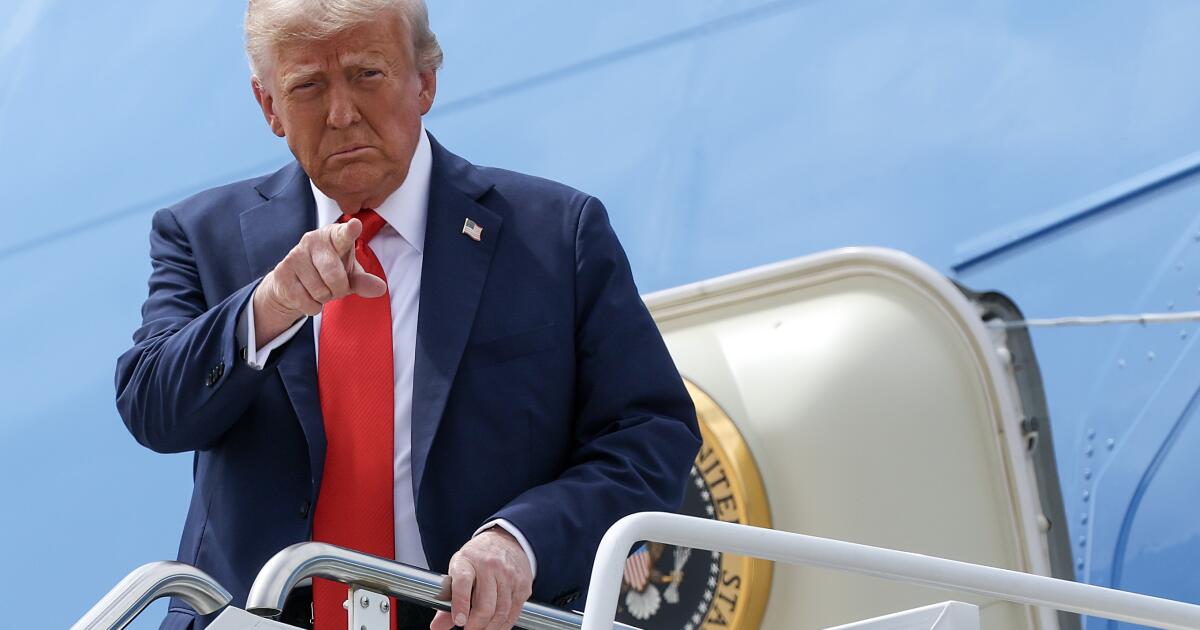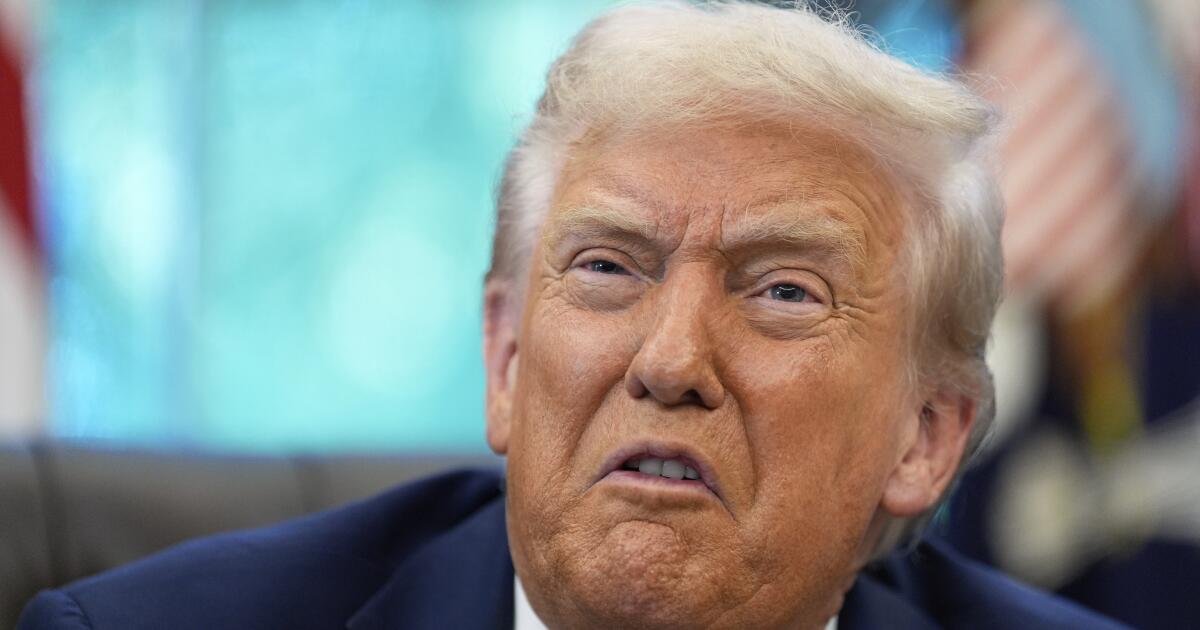In a dizzying few days, Trump ramps up attacks on political opponents and 1st Amendment
WASHINGTON — President Trump has harnessed the weight of his office in recent days to accelerate a campaign of retribution against his perceived political enemies and attacks on 1st Amendment protections.
In the last week alone, Trump replaced a U.S. attorney investigating two of his political adversaries with a loyalist and openly directed the attorney general to find charges to file against them.
His Federal Communications Commission chairman hinted at punitive actions against networks whose journalists and comedians run afoul of the president.
Trump filed a $15-billion lawsuit against the New York Times, only to have it thrown out by a judge.
The acting U.S. attorney in Los Angeles asked the Secret Service to investigate a social media post by Gov. Gavin Newsom’s press office.
The Pentagon announced it was imposing new restrictions on reporters who cover the U.S. military.
The White House officially labeled “antifa,” a loose affiliation of far-left extremists, as “domestic terrorists” — a designation with no basis in U.S. law — posing a direct challenge to free speech protections. And it said lawmakers concerned with the legal predicate for strikes on boats in the Caribbean should simply get over it.
An active investigation into the president’s border advisor over an alleged bribery scheme involving a $50,000 payout was quashed by the White House itself.
Trump emphasized his partisan-fueled dislike of his political opponents during a Sunday memorial service for conservative activist Charlie Kirk, who he said “did not hate his opponents.”
“That’s where I disagreed with Charlie,” Trump said. “I hate my opponents and I don’t want the best for them.”
It has been an extraordinary run of attacks using levers of power that have been seen as sacred arbiters of the public trust for decades, scholars and historians say.
The assault is exclusively targeting Democrats, liberal groups and establishment institutions, just as the administration moves to shield its allies.
Erik Siebert, the U.S. attorney in Virginia, resigned Friday after facing pressure from the Trump administration to bring criminal charges against New York Atty. Gen. Letitia James over alleged mortgage fraud. In a social media post later that day, Trump claimed he had “fired” Siebert.
A few hours later, on Saturday, Trump said he nominated White House aide Lindsey Halligan to take over Siebert’s top prosecutorial role in Virginia, saying she was “tough” and “loyal.”
Later that day, Trump demanded in a social media post addressed to “Pam” — in reference to Atty. Gen. Pam Bondi — that she prosecute James, former FBI Director James Comey and Sen. Adam Schiff (D-Calif.).
“We can’t delay any longer, it’s killing our reputation and credibility,” Trump wrote. “They impeached me twice, and indicted me (5 times!), OVER NOTHING. JUSTICE MUST BE SERVED, NOW!!!”
White House Press Secretary Karoline Leavitt defended Trump’s remarks, saying Monday that the president is “rightfully frustrated” and that he “wants accountability for these corrupt fraudsters who abuse their power, who abuse their oath of office, to target the former president and then candidate for the highest office in the land.”
“It is not weaponizing the Department of Justice to demand accountability for those who weaponize the Department of Justice, and nobody knows what that looks like more than President Trump,” Leavitt told reporters.
As the president called for prosecution of his political opponents, it was reported that Tom Homan, the White House border advisor, was the subject of an undercover FBI case that was later shut down by Trump administration officials. Homan, according to MSNBC, accepted $50,000 in cash from undercover agents after he indicated to them he could get them government contracts.
At Monday’s news briefing, Leavitt said that Homan did not take the money and that the investigation was “another example of the weaponization of the Biden Department of Justice against one of President Trump’s strongest and most vocal supporters.”
“The White House and the president stand by Tom Homan 100% because he did absolutely nothing wrong,” she said.
Some see the recent actions as an erosion of an expected firewall between the Department of Justice and the White House, as well as a shift in the idea of how criminal investigation should be launched.
“If the Department of Justice and any prosecution entity is functioning properly, then that entity is investigating crimes and not people,” said John Hasnas, a law professor at Georgetown University.
The Trump administration has also begun a military campaign against vessels crossing the Caribbean Sea departing from Venezuela that it says are carrying narcotics and drug traffickers. But the targeted killing of individuals at sea is raising concern among legal scholars that the administration’s operation is extrajudicial, and Democratic lawmakers, including Schiff, have introduced a bill in recent days asserting the ongoing campaign violates the War Powers Resolution.
Political influence has long played a role with federal prosecutors who are political appointees, Hasnas said, but under “the current situation it’s magnified greatly.”
“The interesting thing about the current situation is that the Trump administration is not even trying to hide it,” he said.
Schiff said he sees it as an effort to “try to silence and intimidate.” In July, Trump accused Schiff — who led the first impeachment inquiry into Trump — of committing mortgage fraud, which Schiff has denied.
“What he wants to try to do is not just go after me and Letitia James or Lisa Cook, but rather send a message that anyone who stands up to him on anything, anyone who has the audacity to call out his corruption will be a target, and they will go after you,” Schiff said in an interview Sunday.
Trump campaigned in part on protecting free speech, especially that of conservatives, who he claimed had been broadly censored by the Biden administration and “woke” leftist culture in the U.S. Many of his most ardent supporters — including billionaire Elon Musk and now-Vice President JD Vance — praised Trump as a champion of free speech.
However, since Trump took office, his administration has repeatedly sought to silence his critics, including in the media, and crack down on speech that does not align with his politics.
And in the wake of Kirk’s killing on Sept. 10, those efforts have escalated into an unprecedented attack on free speech and expression, according to constitutional scholars and media experts.
“The administration is showing a stunning ignorance and disregard of the 1st Amendment,” said Erwin Chemerinsky, dean of the UC Berkeley Law School.
“We are at an unprecedented place in American history in terms of the targeting of free press and the exercise of free speech,” said Ken Paulson, former editor in chief of USA Today and now director of the Free Speech Center at Middle Tennessee State University.
“We’ve had periods in American history like the Red Scare, in which Americans were to turn in neighbors who they thought leaned left, but this is a nonstop, multifaceted, multiplatform attack on all of our free speech rights,” Paulson said. “I’m actually quite stunned at the velocity of this and the boldness of it.”
Bondi recently railed against “hate speech” — which the Supreme Court has previously defended — in an online post, suggesting the Justice Department will investigate those who speak out against conservatives.
FCC Chairman Brendan Carr threatened ABC and its parent company, Disney, with repercussions if they did not yank Jimmy Kimmel off the air after Kimmel made comments about Kirk’s alleged killer that Carr found distasteful. ABC swiftly suspended Kimmel’s show, though Disney announced Monday that it would return Tuesday.
The Pentagon, meanwhile, said it will require news organizations to agree not to disclose any information the government has not approved for release and revoke the press credentials of those who publish sensitive material without approval.
Critics of the administration, free speech organizations and even some conservative pundits who have long criticized the “cancel culture” of the progressive left have spoken out against some of those policies. Scholars have too, saying the amalgam of actions by the administration represent a dangerous departure from U.S. law and tradition.
“What unites all of this is how blatantly inconsistent it is with the 1st Amendment,” Chemerinsky said.
Chemerinsky said lower courts have consistently pushed back against the administration’s overreaches when it comes to protected speech, and he expects they will continue to do so.
He also said that, although the Supreme Court has frequently sided with the president in disputes over his policy decisions, it has also consistently defended freedom of speech, and he hopes it will continue to do so if some of the free speech policies above reach the high court.
“If there’s anything this court has said repeatedly, it’s that the government can’t prevent or stop speech based on the viewpoint expressed,” Chemerinsky said.
Paulson said that American media companies must refuse to obey and continue to cover the Trump administration and the Pentagon as aggressively as ever, and that average Americans must recognize the severity of the threat posed by such censorship and speak out against it, no matter their political persuasion.
“This is real — a full-throttle assault on free speech in America,” Paulson said. “And it’s going to be up to the citizenry to do something about it.”
Chemerinsky said defending free speech should be an issue that unites all Americans, not least because political power changes hands.
“It’s understandable that those in power want to silence the speech that they don’t like, but the whole point of the 1st Amendment is to protect speech we don’t like,” he said. “We don’t need the 1st Amendment to protect the speech we like.”

